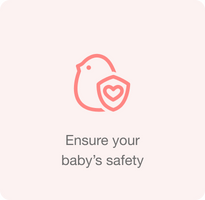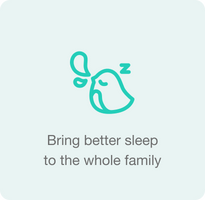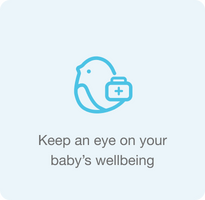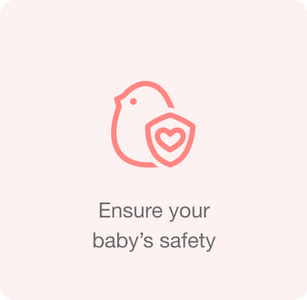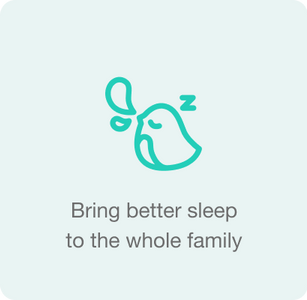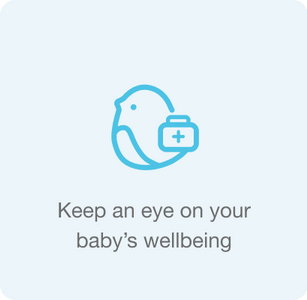Top 10 Sleep Training Barriers to Consistency (And How To Solve Them)
Next on our Sleep Training Series, the inevitable sleep training barriers to consistency as given by Dr. Weissbluth and how to face them head-on!
There are so many reactions that you get when you talk about Sleep Training with parents. The first few, we already know- the big misconception that Sleep Training is as good as saying “leave your child in their room in the dark until they cry themselves to sleep. Just a reminder that there are many methods to Sleep Train and this quarter on our blog, we’re talking about preventing sleep problems, taking mainly Dr. Weissbluth’s Healthy Sleep Habits, Happy Child as our source.
In fact, today’s post inspiration comes entirely from Dr. Weissbluth’s “Barriers to Training” found in the book. We believe all of these barriers are barriers to consistency in sleep training, but we’ve also added some we’ve run into during our research this year.
Dr. Weissbluth’s on the Sleep Training Barriers to Treatment:
“Child psychologists and child psychiatrists deal with barriers to treatment every day in their attempts to help struggling parents deal with older children. But these same barriers often interfere with executing a treatment plan to help a much younger child sleep well. Perhaps they are only speed bumps that slow down the process of helping your child. If, however, these barriers are major roadblocks preventing you from treating your child’s sleep problem, then consider getting professional counseling to overcome them before working on your child’s sleep problem.”
So, what are the Sleep Training barriers to consistency? Let’s take a look and see how many of these could be presenting themselves in your family, how to face them and possibly solve them.

1. Parents lack information or tools (tools revisited on #10)
Having a child places you in front of a lot of obstacles you had never been faced with before. From the very moment mom tests positive, life is constantly surprising you with scenarios you never thought you’d be in. So, it’s normal that maybe we’d have some unrealistic expectations. Sleep isn’t going to be easy, it won’t always be glamorous, and in fact, sometimes you’ll wonder how you even managed to brush your hair that day. That’s all okay, but some of the unrealistic expectations have regarding age-appropriate sleep.
According to Dr. Weissbluth:
“Parents may have unrealistic expectations or misunderstandings regarding age-appropriate sleep needs and sleep schedules. Or parents may not appreciate the benefits of healthy sleep or recognize the harm from sleep deprivation in their children. [...] Dr. John Lavigne, chief psychologist at Children’s Memorial Hospital in Chicago, strongly believes that most of the parents he sees are psychologically healthy but simply misguided or lacking skills to solve some of the common parenting problems.”
Some parents believe that if their baby needs to sleep, they just will. At some things, baby is an expert, at other, they’re just figuring it out. Sleep often falls into the second category and if we as parents don’t help them when they’re feeling drowsy, babies can often stay awake longer than they should and get overtired, creating sleep problems.
2. Working-Parents' guilt, exhaustion, or absence
Being a working parent isn’t easy, of course, but most of us have to do it! Sometimes you can’t be home as often as you like or you miss special moments, or you just want to spend some time with them for a little while after work. This guilt and the exhaustion and absence that come with working and parenting can cause problems with consistency. Making exceptions to your baby’s sleep training isn’t helping the process, no matter how heartwarming it is to fit in that cozy squeeze when you get home.
“Parents feel guilty because they are not available or because they do not want to be available to their child. So they give in to whatever their child wants. Or, selfishly, the parents feel that their child has to adapt to their schedule and stay up late at night. [...] this may be more common with a parent who works outside the home, because (s)he does not see the child’s overtired behavior during the day. Or perhaps it’s not guilt but sheer exhaustion from the demands of work that prevents the parent from being persistent and consistent. [...] Dr. Vicki Lavigne, a child psychologist, commonly sees fathers who are absent from the home so much that they do not recognize or appreciate the seriousness of the problem and are often in denial.”
If you’re a parent who has to step away from home for many hours to work or has to be away from your baby in order to provide, always keep in mind that this isn’t an excuse to disrupt your baby’s sleep training. Even if, in the best of cases, you’re doing the disrupting and also the frequent soothing during the night, you’re still creating a problem long-term. Find a way for you to spend time with your children and also keep in line with the sleeping patterns set by their age-appropriate training.
3. A Bad Marriage
One of the most heart-breaking barriers on this list is that of a bad relationship or marriage. This can cause a parent to want to break away from their own bedroom and spend time with baby to avoid their partner or become less strict on behavior, schedules, diet, etc. to be “the good parent” in front of the child’s eyes. This, of course, will cause a lot of problems long-term.
Dr. Weissbluth says:
“One possible issue resulting from a troubled relationship is that one parent becomes overly permissive in order to keep the child allied with him or her for support and love. This alliance maintains the parent’s self-esteem. The parents can’t communicate effectively with each other to develop a practical plan that can be consistently implemented.”
Developing a practical plan that can consistently be implemented sounds like the way forward for just about anything you’re struggling at, right? Dr. Weissbluth’s advice seems both sound and applicable.
4. Parents have abandonment issues
If the parents have issues dating back to when they were children, this can cause the feeling of desperately wanting to be liked by your child. If you had a parent that was less than perfect, perhaps you’ll want to be the cool parent, the fun parent, and the one who might not quite have a firm hand when it comes to training.
Whether this means you let them skip the vegetables, stay on diapers and bottles longer, or you’re not consistent on their sleep training, it’s going to cause them to fall behind.
Remember that you’re not your parents and keeping a structure in your child’s life for their benefit will not make them like you less. In fact, a structure will allow them to not be overtired and will, as a result, keep them happier.

5. Parents have authority issues
No one says it better than Dr. Weissbluth himself:
“Some parents do not feel comfortable with rules and authority. It goes against their grain because perhaps they were raised without rules or authority. [...] They might have a “live and let live” philosophy. [...] In extreme cases, a parent wants to but cannot be rebellious, and so the parent gets gratification from seeing the child rebel.”
Even if you’re a particularly sweet and caring person who wouldn’t hurt a fly, never raises their voice, and is overall likable, you still need to be authoritative about your child’s best interests. Whether that means asking that bully at the playground to cut it out or laying down the sleep-training law within your own household. You can “live and let [your baby] live” while also providing the best environment, schedule, etc. for them to rest better.
Are you a mom trying to keep baby safe while they sleep?
Sleep safety 101
Check out our pediatrician/ Co-creator of Cubo Ai's 12 FAQs About Baby Sleep Safety, 3 Risks of Baby Sleeping on Stomach, 4 Tips for Improving Baby Sleep Safety and more!
6. Family stress issues
There are few things that make your life more chaotic than having a family. You go from being totally void of worry, footloose and fancy-free, to having a huge amount of responsibilities. Some families can take on the sudden change quite well, usually, they have exorbitant amounts of support. Others, well, they struggle. Apparently, it’s getting ahead of problems that could ease this situation.
Dr. Weissbluth says:
“ [when parents] live from crisis to crisis, and family life is chaotic. The parents are reactive instead of proactive: They react emotionally instead of thoughtfully. The parents are not necessarily overindulgent, but they are overly inconsistent.”
If you try to keep the crises at bay or control them before they come around, the consistency to your family’s entire life, not just the sleep training. Creating order, routines, and a schedule will help create more peace and consistency in all areas of your family’s life.

7. Parents have undiagnosed depression, ADHD, bipolar disorder, or other mental health problem
Mental health is a normal problem. Many people struggle with both diagnosed and undiagnosed mental health issues. When you have a child, this can interrupt the way you do just about anything. This is certainly not the most common barrier to consistency but let’s not forget that this can extend to other people in the family as well who have an impact on your baby’s life.
According to Dr. Weissbluth
“These are uncommon, but depression occurs in 5 percent of American adults, ADHD in 4 percent, and bipolar disorder in 1 percent. Education and coaching will often fail if the parent has significant untreated mental health issues. Many times the diagnoses re not recognized, especially with ADHD, which occurs equally in mothers and fathers. But problems regarding parenting are especially prominent if the mother is affected, because she is the one who is usually expected to organize schedules and routines such as regular bedtimes and naps.”
If you have a mental health problem in your family, address it by creating the best possible situation for everyone to parent in ways that work for them. Work around the limitations or triggers that keep either parent from performing comfortably or efficiently in their role as mom or dad.
8. Therapist failure
Here’s Dr. Weissbluth on the barrier of a therapist failure: “Perhaps a therapist makes it clear that the parents have to work every day to permanently prevent the problem from resurfacing. I see this time and time again. For example, after working hard to successfully correct a sleep problem caused by a bedtime that was too late, and everyone was sleeping better, the parent came and asked if he could start keeping his child later up at night!”
By therapist, I think it’s clear that he means a Sleep Consultant. Do you absolutely need one? Here’s our post on how the top 6 FAQs about Baby Sleep Consultants. By “failure” he doesn’t seem to be talking about the consultant doing a bad job, but rather the parent taking the great results for granted. If your consultant’s advice and assistance fail to be consistently applied, you might find that the great sleep you were having once you applied it will be short-lived.

9. Criticism from other parents
So this one isn’t in Dr. Weissbluth’s book, but rather on that we saw on our own.
Often on these Sleep Training support groups, you’ll see people who are very committed to the Sleep Training process asking questions, trying to get informed. For some reason, despite being a group for this purpose, other parents will begin a discussion about how they shouldn’t be sleep training at all, how it’s a cruel practice, how they totally look down upon this parent.
This practice can be detrimental not just for the parent’s state of mind, but to the practice they’re trying to accomplish. Regardless of how determined they are, criticism from other parents will make them feel like maybe they’re not such a good parent after all and when a sleep problem arises and the baby inevitably cries, they’ll remember the critic and doubt themselves. This, of course, is a huge barrier to consistency. As if the heartstrings weren’t pulled enough already by a baby who doesn’t want to sleep but is overtired, a mind full of guilt and shame from other parents is also hard to overcome.
We believe that if parents don’t want to sleep train (here’s why some choose not to) they should be able to choose. However, those who do want to should have that freedom as well. As hard to believe as it is, some parents need to be reminded that moms and dads know what’s best for their own children, not others’. Allowing others to do what’s best for their children per their own judgment is the best way we can help those families be healthy and happy.
10. Lack of tools
It’s one thing to be in the room as your baby cries, another to be in the hallway, and a third to watch from a tool like a smart baby monitor. With a regular monitor, you don’t have many choices. With smart baby monitors, you can get cry alerts (or not), you can make sure they’re safe even without being glued to the image. You can check in as often or as little as you like and baby monitors like Cubo will send you notifications when you need them and take photos and videos of cute moments for you so you don’t miss a thing. Shameless plug aside, tools like Cubo can allow you to be consistent in your Sleep Training. You can be there for baby without getting in the way of the training that will save you countless hours and give you healthier, happier nights.
Finally, here’s the conclusion from Dr. Weissbluth, who prescribes, as the biggest solution to these sleep training barriers to consistency a well-thought-out plan.
“If you see in yourself or your family barriers to treatment, and therefore know that treatment of sleep problems will be difficult for you, then work extra hard with the resources available for soothing during the first four months to prevent sleep problems from ever arising in the first place.
Dr. Robert Daniels often starts with questions such as: What is the desired behavior you want from your child? What is the desired outcome? What is the endpoint of treatment? What would you like to see happen? Both parents need to agree on what the goal is and how to achieve it before beginning a treatment plan. The failure to agree on a goal makes it difficult for parents to cooperate with each other to achieve success. Dr. Daniels observes that most parents agree on the goal but not necessarily on the path to accomplish it.”
What have been your Sleep Training Barriers to Consistency? Tell us about it over at our Cubo Community!

Cubo Ai
Smart Baby Monitor, bird, techie, baby guru, and sleep-safety enthusiast. Cubo has a keen eye for detail, loves baby photography, and never sleeps on the job. You can find Cubo in thousands of nurseries around the world and here on the blog helping parents learn more about the topics they care about.










